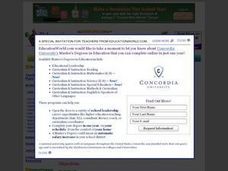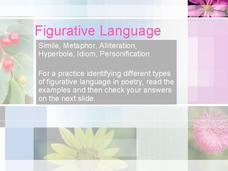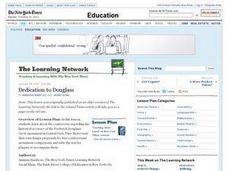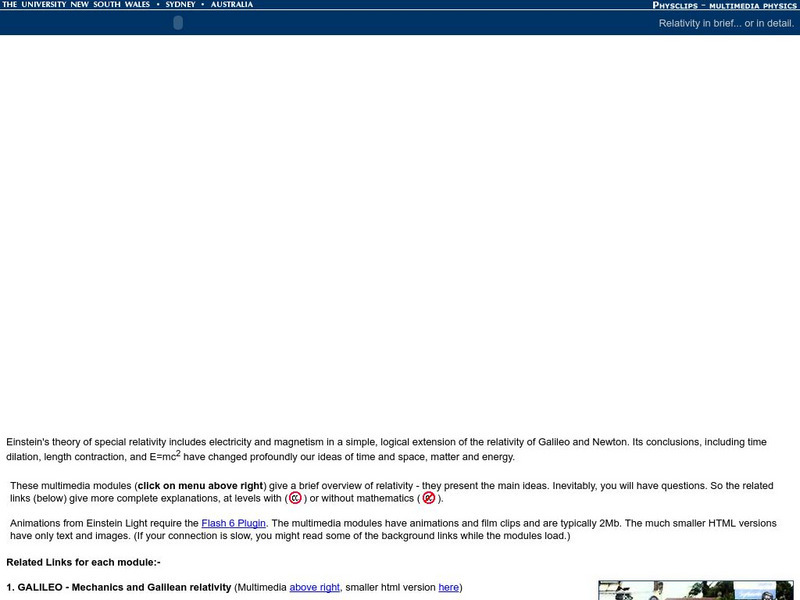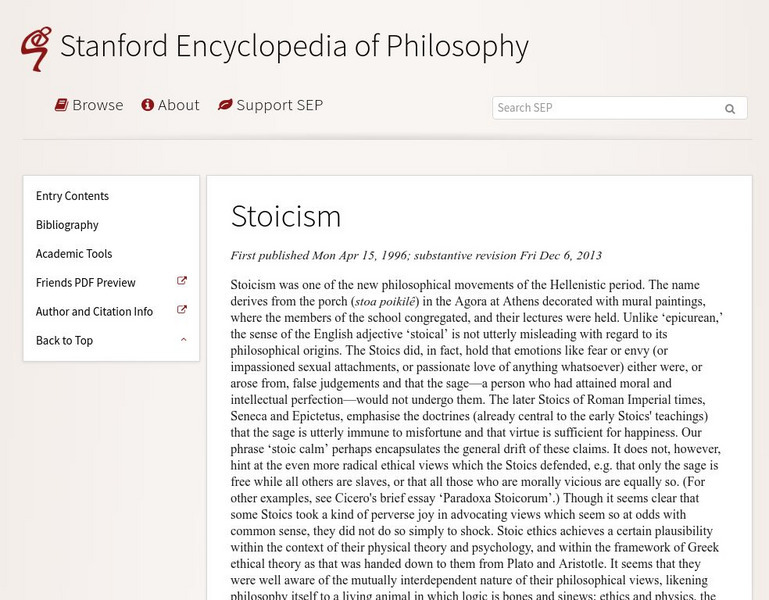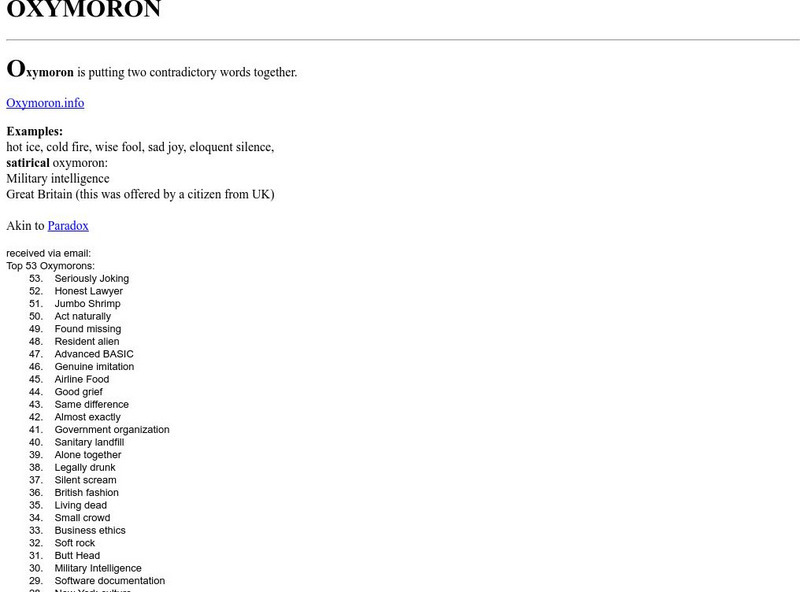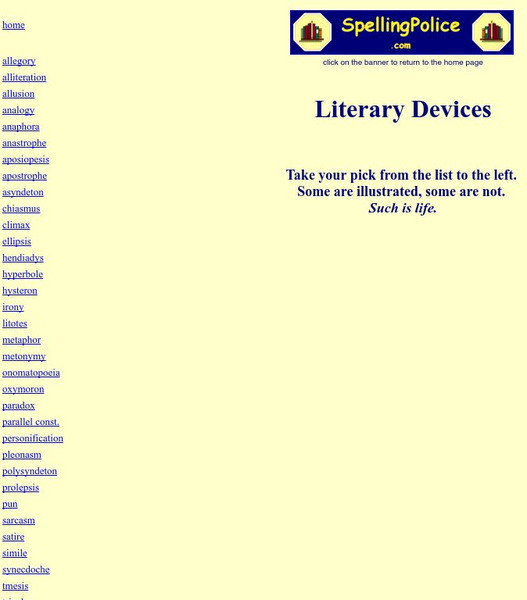Curated OER
Poetry Shopping Spree
Scholars demonstrate the ability to evaluate authors' use of literary elements such as metaphor, simile, personification, imagery, and onomatopoeia. They are provided with a checklist and must shop for poems that contain the poetry terms...
Curated OER
Literary Terms
Seriously, 93 slides of literary terms? Yes, and well worth the time, although perhaps not all at once. The beauty here is in the concise, easy-to-understand definitions for such well-known terms as imagery and personification, as well...
Curated OER
Is Perception Reality? Writing Paradoxes in Poetry
Explore the paradox of the universe - or, at least, of popular music - with this lesson. Using the songs "Inaudible Melodies" by Jack Johnson and "She" by Green Day, your class will complete a graphic organizer to help them understand...
Curated OER
Errors vs. Rhetorical Devices
Is there a difference between writing errors and employing rhetorical devices? This presentation argues that there is a difference, but it might be a finer point than one would think. Addressing double entendre, oxymorons, and parody,...
Curated OER
Figurative Language
I have a pair of ducks; one can’t swim. Viewers are introduced to several literary terms (paradox, oxymoron, pun, irony, etc.) that are defined and illustrated with examples. Then they are asked to identify the figurative language used...
Curated OER
Figures of Speech Quotes and Examples
Providing several examples of figures of speech, such as irony, paradox, and personification, this presentation could complement your lecture on pragmatic humor or humor in writing. Examples from Lewis Carroll's Alice's Adventures in...
Curated OER
Dedication to Douglass
Students study the controversy surrounding the proposed Frederick Douglass Circle monument in Central Park. They review the notion of historical inaccuracy by reading and discussing the article, "In Douglass Tribute, Slave Folklore and...
Curated OER
Faraday's Law of Induction
Students study Faraday's law of induction and the equations that show how to calculate electromagnetic induction. In this electromagnetic lesson students complete several experiments on the law of induction.
Curated OER
When Fair is Foul: Paradox and Equivocation in Macbeth
Pupils read Macbeth for examples of paradox and equivocation in the text. In this literature-response lesson plan, students work in groups to analyze Shakespeare's writing for use of paradox using handouts to guide their search. Student...
University of New South Wales (Australia)
University of New South Wales: Einstein Light
Einstein Light highlights the Theory of Special Relativity and related topics. Learn how Galileo, Maxwell, and Einstein contributed to our knowledge of relativity, electricity, magnetism, and time by watching fun, interactive modules.
Georgia Department of Education
Ga Virtual Learning: American Transcendentalism: Key Terms
This lesson from a unit on American Transcendentalism focuses on key literary terms that fit the writings of the period and an interactive crossword puzzle using the terms and their definitions.
Stanford University
Stanford Encyclopedia of Philosophy: Stoic Ethics
An extensive discussion of the ethics of Stoicism. Very detailed, includes lots of definitions of Greek words necessary to the philosophy.
PBS
Pbs Nova: Relativity and the Cosmos
This well-written explanation of relativity includes animations and pictures which may be helpful in understanding a tough topic.
Texas Education Agency
Texas Gateway: Paradox (English Iii Reading)
Source: Paradoxes, James Guppy, Flickr Paradox is a type of figurative language that A Handbook to Literature defines as "a statement that while seemingly contradictory or absurd may actually be well-founded or true." You will find...
Texas Education Agency
Texas Gateway: Irony, Sarcasm, and Paradox (English Ii Reading)
[Accessible by TX Educators. Free Registration/Login Required] In this lesson, you will learn to evaluate the role of irony, paradox, and sarcasm in literary nonfiction such as speeches and essays. It includes the definitions and...
Texas Education Agency
Texas Gateway: Irony, Sarcasm, Paradox (English I Reading)
[Accessible by TX Educators. Free Registration/Login Required] In this lesson, students will learn to identify and explain the purposes of irony and paradox in poetry. Both of these poetic devices are ways of saying one thing and meaning...
Ted Nellen
Cyber English (By Ted Nellen): Oxymoron
This is a glossary entry for the literary term "Oxymoron" including a definition and a list of more that 50 oxymorons.
Writing Fix
Writing Fix: An I Pod Inspired Poetry Lesson: Paradox Poetry
Jack Johnson's "Inaudible Melodies" creates an interesting paradox of how society perceives itself versus the reality of how society really behaves. After listening to a second song using paradox in order to further understand the...
TED Talks
Ted: Ted Ed: What Can Schrodinger's Cat Teach Us About Quantum Mechanics?
One great example of quantum physics' weirdness can be shown in the Schrodinger's cat thought experiment. Josh Samani walks us through this experiment in quantum entanglement. [5:24]
Other
Spelling police.com: Oxymoron
Informational site that provides the definition for and examples of oxymoron. L.9-10.5a Figures of Speech
Other
Spelling police.com: Literary Devices
A simple list of literary terms. Click on each for a definition and examples.
University of Victoria (Canada)
The U Vic Writer's Guide: General Literary Terms
The University of Victoria's Writer's Guide includes an extensive list of literary and rhetorical terms. List can be displayed alphabetically.
Stanford University
Stanford Encyclopedia of Philosophy: Russell's Paradox
Explains briefly the history and significance of Russell's famous logical paradox. Includes links to other Russell-related websites. Uses a minimum of technical notation.
University of Victoria (Canada)
The U Vic Writer's Guide: Literary Term: Paradox
Definition of paradox with example from the poetry of John Donne and links to related terms such as oxymoron and metaphysical conceit.


